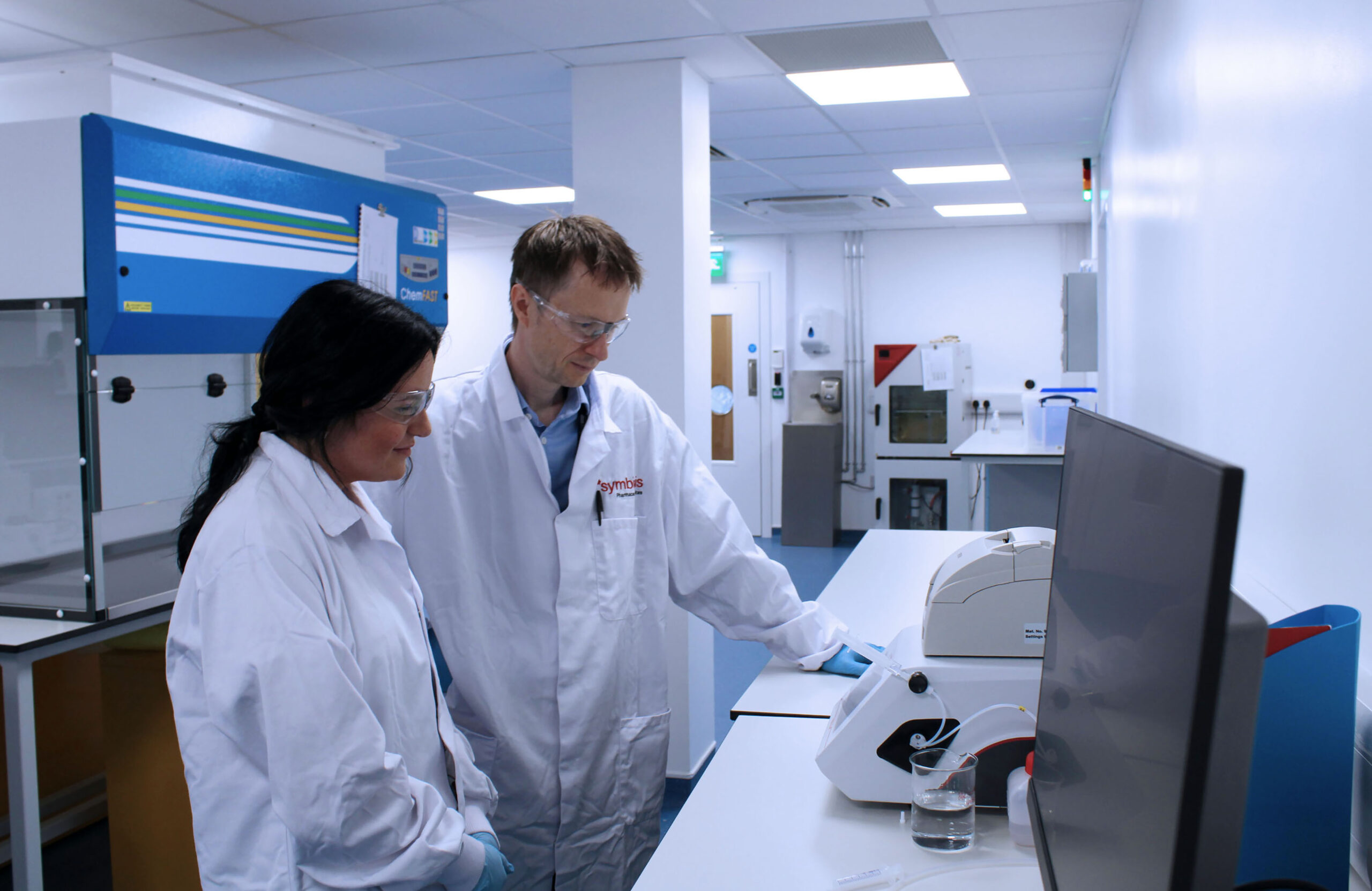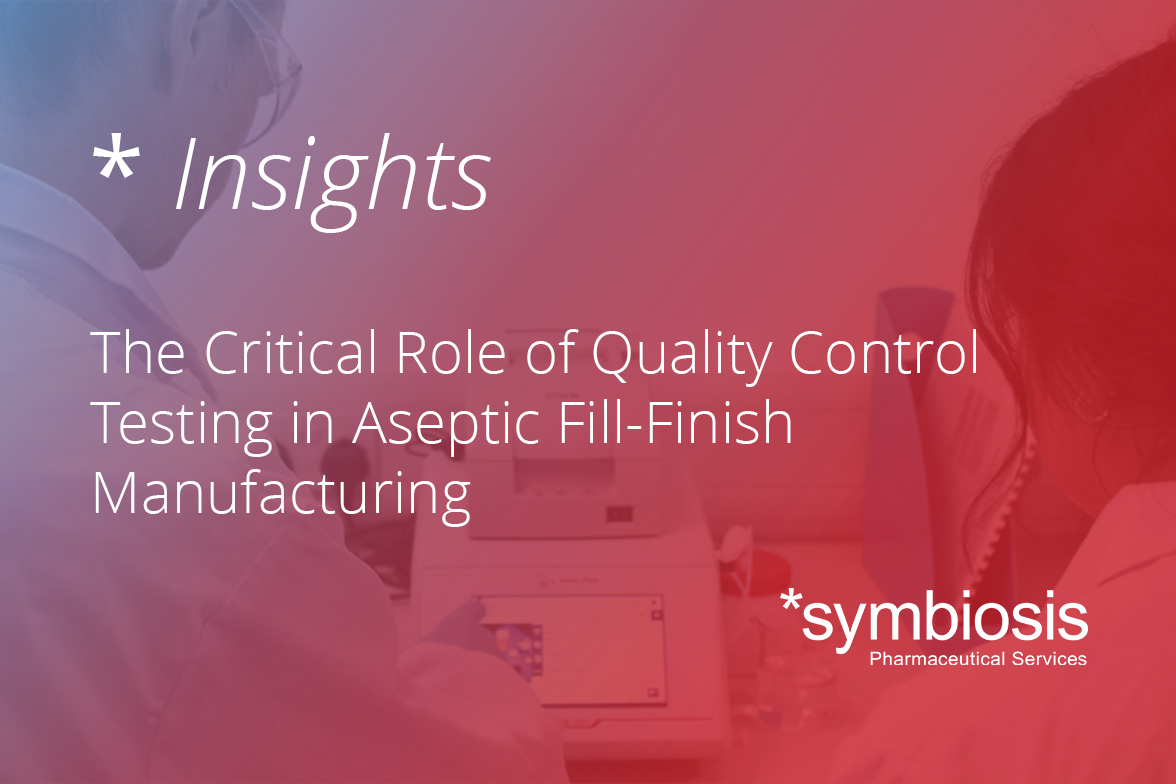In this article, Alison Clayton, Strategic Projects Director, explores the pivotal role of effective QC testing services in progressing pharmaceutical products to the clinic and commercialization.
Why is QC testing important?
Quality Control (QC) testing is a critical pillar in ensuring the safety and efficacy of pharmaceutical products intended for human parenteral administration. Its significance spans various checkpoints in the manufacturing process, primarily in monitoring and controlling the production stages and the final sterile product.
One of its critical roles lies in meticulously overseeing and regulating the manufacturing process. For parenteral pharmaceuticals, stringent monitoring and control protocols are indispensable in providing standardized and harmonized QC testing services of the highest quality. This is vital to maintaining sterile conditions and preserving product integrity from inception to the final drug product.
Ensuring the purity and safety of pharmaceuticals intended for injection involves a multi-faceted approach encompassing environmental monitoring, in-process testing, and rigorous evaluations of final product. Environmental monitoring maintains the sterile integrity of the production environment. Additionally, in-process testing provides real-time insights into the ongoing manufacturing phases, enabling prompt adjustments to optimize the product’s quality and efficacy. Final product testing serves as a critical checkpoint to guarantee the quality and safety of pharmaceuticals before they reach patients.
When seamlessly integrated, these services not only ensure compliance but also foster streamlined operations, efficiency, and ultimately, the delivery of safe and reliable pharmaceuticals to patients worldwide.
The benefits of integrated QC testing facilities
The integration of various facets in manufacturing and QC processes represents a transformative approach to pharmaceutical manufacturing that harmonizes and optimizes the entire quality testing process. Effective application of this concept enhances efficiency and expedites timelines, providing a seamless journey from testing to product release.
Combining in-house pharmaceutical QC testing and manufacturing services enables control over QC within the manufacturing processes. This integrated approach expedites timelines by enabling real-time data flow for Qualified Person (QP) review as it’s generated. This parallel processing enables swift and prompt product release, significantly reducing time-to-clinic, or market, without compromising quality.
Integral to successful implementation of QC testing is the adept navigation of regulatory agency inspections, notably by entities such as the Medicines and Healthcare Products Regulatory Agency (MHRA), necessitating a holistic and strategic approach. Success at first attempt stems from a dedicated, skilled, knowledgeable team and extensive upfront preparation work. The seamless integration and coordination across quality systems, QC, and QA teams enables a comprehensive and meticulous approach to compliance. This interdepartmental collaboration facilitates streamlined operations and permits a comprehensive evaluation and readiness for regulatory assessments.
Additionally, the flexibility fostered by integrated processes is vital to the qualification or validation of in-house methods or customisation to meet specific clinical trial requirements. However, recognizing the unique complexities of certain biologics, it is critical to acknowledge that some bespoke testing might continue at third-party sites where in-house testing isn’t feasible. This strategic outsourcing guarantees that even the most specialized testing needs are met comprehensively.

Facility design: harmonization and standardization in QC testing
Ensuring that QC testing facilities meet the highest standards is paramount within the pharmaceutical manufacturing landscape, and investing in these services is a pivotal step in achieving drug development success. Using a custom-built facility equipped with state-of-the-art equipment enables standardization and harmonization of the entire QC testing process, enriching the flexibility and scope of services offered.
Achieving this integration relies heavily on the effective design and meticulous planning of QC facilities. The following features exemplify the strategic and meticulous approach undertaken in Symbiosis’ facility design, enabling comprehensive testing services while adhering to stringent regulatory standards:
- Specialized facility design features:
Incorporation of viewing windows and client-accessible areas for active observation of testing procedures, promoting transparency and fostering trust among collaborating parties and regulatory bodies.
- Segregation of microbiology and chemistry labs:
Implementation of separate labs equipped with dedicated airflow systems to prevent cross-contamination, verify stringent adherence to regulatory standards, and enhance product safety.
- In-house microbiology and analytical testing capabilities:
Establishment of dedicated in-house capabilities for microbiology and analytical testing, including, complementing an extensive range of sub-contracted tests for comprehensive service offerings.
- Enhanced stability chamber for controlled environment testing:
Integration of storage facilities with controlled temperature and humidity settings, designed for current stability testing needs and for future expansions. This enables comprehensive testing procedures and facilitates ICH pharmaceutical stability studies for thorough product assessment.
- Integrated testing service with comprehensive support:
A cohesive approach integrating testing services across manufacturing and customer support, ensuring streamlined operations and comprehensive client service.
Drug manufacturers can elevate QC testing services to meet the highest industry standards by incorporating these specialized features and adopting meticulous facility design.
The advantages of strategic outsourcing
Investment in QC testing facilities can be costly and require extensive staff expertise to be run appropriately. Partners and collaborators therefore are critical to securing affordable access to QC testing services with the experienced staff to bring success to a project. Embracing collaborative efforts with industry experts, research institutions, or specialized testing partners fosters innovation and continuous improvement in QC methodologies, maintaining the delivery of safe and high-quality sterile drug products to patients worldwide.
In particular, Contract Manufacturing Organizations (CMOs) often play a pivotal role in safeguarding product integrity and safety. Outsourcing QC testing services to proficient CMOs serves as a strategic asset for drug developers, unlocking an array of benefits and possibilities without the need for expensive in-house investment.
By leveraging the extensive expertise and resources of CMOs, drug developers gain access to a comprehensive suite of in-house testing capabilities, facilitating seamless and expedited testing procedures. This strategic partnership empowers drug developers to focus on their core competencies while entrusting the intricate QC testing processes to specialized hands.
The inherent advantage of collaborating with specialized manufacturing service providers lies in their ability to provide a versatile and adaptable approach to QC testing. With a diverse clientele and an extensive portfolio of services, CMOs are adept at tailoring testing protocols to meet the varied needs and specifications of different drug developers. This flexibility, combined with stringent adherence to regulatory standards, underscores the efficacy and reliability of outsourced QC testing services provided by CMOs.
Moreover, partnering with specialized CMOs allows for cost optimization and operational agility. This mitigates the capital expenditure associated with infrastructure and offers scalability, supporting adaptable solutions that align with the dynamic needs of drug development projects.
Ensuring patient well-being through QC testing
The culmination of standardized and harmonized drug testing and analytical capabilities marks a significant stride toward greater control over test scheduling and expedited results. This translates into invaluable time savings in drug development, empowering drug developers with reduced regulatory risk and accelerated timelines for therapies reaching patients.
Through expediting the drug development timeline and robust regulatory compliance, integrated QC capabilities enable patient-centric care paradigms to be implemented. Further, by championing innovation in QC testing, we can better provide safe and efficacious parenteral drug products to people in need.



